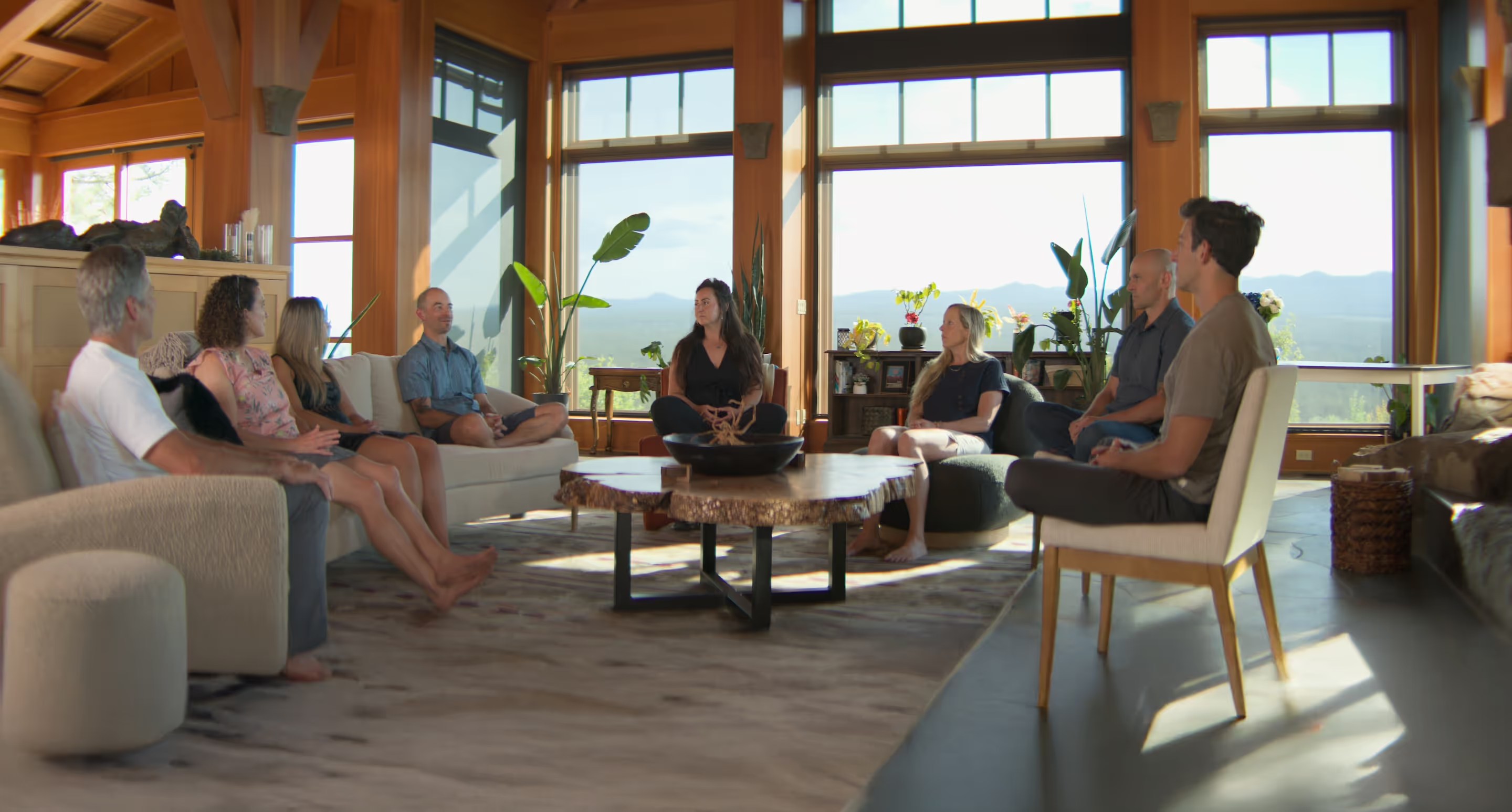What Happens at a Psychedelic Retreat and Why People Keep Coming Back Changed

As interest in psychedelics grows, retreats have become spaces where people can explore personal growth, healing, and spirituality. Guided by clinical research and academic studies, these retreats offer a supportive setting for experiencing psychedelics in a safe and structured way. This article looks at what happens during these multi-day experiences, how they may facilitate transformation, and the human elements that shape each journey.
The Anatomy of a Psychedelic Experience
Psychedelic retreats are typically multi-day programs carefully designed to maximize therapeutic potential. As such, they often employ a comprehensive approach extending beyond the administration of substances alone. While modern-day psychedelic retreats continue to evolve, many roughly embody a three-phase framework shaped by protocols used in clinical trials that are now considered best practice.
The Three-Phase Framework
Due to the crucial nature of preparation and post-journey integration, many retreats include the following components in their psychedelic experiences:
- Preparation Phase: Before any substances are introduced, participants engage in intention-setting exercises, educational sessions about the substances and their effects, and psychological grounding practices. Participants are encouraged to consider and develop their personal ‘set’ and ‘setting’ before the experience, concepts strongly associated with psychedelic pioneer Timothy Leary. Odyssey retreats include group preparation sessions both at the retreat and beforehand, along with a detailed preparation guide to help participants clarify their goals and address anxieties before the retreat begins.
- Journey Phase: Due to state regulations and general safety, the core experience of a legal retreat takes place at a licensed service center, often incorporating:
- Carefully curated music, ranging from traditional indigenous songs and classical instrumentals to soothing ambience
- Comfortable, quiet physical spaces with mattresses, blankets, and eye masks
- The presence of experienced facilitators providing continuous support
- Elements conducive to reflection and relaxation, including natural light and scenery. Odyssey’s retreats in Oregon combine the serenity of tranquil nature with the assurance of highly-trained and empathetic facilitators..
- Integration Phase: Potentially the most crucial yet overlooked component, integration involves introspective activities designed to help participants process insights gained during the psychedelic experience. This may include:
- Group sharing circles where participants verbalize their experiences
- One-on-one counseling sessions with therapists or integration specialists
- Creative expression through art, movement, journaling, and more
- Practical planning for crystallizing insights and implementing them in daily life
Beyond the Core Experience
The comprehensive three-part model is often the most substantial part of a psychedelic retreat. However, in some cases, the retreat experience extends beyond these three phases, incorporating complementary practices to enhance the overall journey:
- Mind-Body Practices: Yoga, meditation, breathwork, and movement sessions help participants connect with their bodies and regulate their nervous systems before and after ceremonies.
- Community Building: Shared meals, group activities, and informal social time foster connections between participants, creating a supportive container for vulnerability and growth. This often complements and enhances group sharing circles, as greater familiarity enables deeper understanding.
- Nature Connection: From coastal beaches to lush forests, many retreats are intentionally situated in natural settings. These backdrops often play a pivotal role in constructing a calm, tranquil environment for any psychedelic journey.
- Dietary Protocols: Some retreats implement specific dietary guidelines (avoiding certain foods, alcohol, or caffeine) in the days leading up to ceremonies, which may enhance the psychedelic experience while reducing potential physical discomfort. This is especially prominent with ayahuasca, known for its intense purgative effects and potential interactions with disagreeable foods.
How and Why Change Occurs
The transformative experiences reported by many retreat participants appear to stem from an interplay of neurobiological processes, psychological frameworks, and social dynamics. Given these complexities, it should come as no surprise that multiple mechanisms work together to produce the mystical experience.
Neurobiological Pathways
Current research suggests several key neurobiological mechanisms through which psychedelics may facilitate therapeutic change:
- Default Mode Network (DMN) Modulation: Psychedelics temporarily disrupt the brain's default mode network, a set of interconnected regions associated with self-referential thinking and rumination. This disruption may create a "reset" opportunity, allowing entrenched thought patterns to be overridden.
- Increased Neuroplasticity: Psilocybin appears to promote neuroplasticity, the brain's ability to form new neural connections. Research from leading institutions has demonstrated increased communication between previously disconnected brain regions following psilocybin administration, potentially creating windows for learning and change.
- Emotional Processing: Psychedelics may facilitate access to emotional material that is typically suppressed or difficult to process, allowing for emotional release within the supportive retreat environment.
Read more: The Science of Psilocybin Therapy
Psychological Frameworks
Beyond neurobiological changes, several psychological mechanisms appear central to the transformation process:
- The Power of Set and Setting: The concept of "set" (mindset, intentions, and expectations) and "setting" (physical and social environment) profoundly influences the quality and outcomes of psychedelic experiences. Retreats carefully cultivate both elements to create conditions for meaningful experiences.
- Mystical and Peak Experiences: Many participants report mystical-type experiences characterized by feelings of unity, transcendence of time and space, ineffability, and a sense of encountering ultimate reality. Research suggests these experiences correlate strongly with positive therapeutic outcomes.
- Narrative Reconstruction: The psychedelic experience often allows individuals to challenge rigid beliefs and view the narrative of their life from new perspectives.
The Integration Imperative
Integration, the process of making meaning from psychedelic experiences and incorporating insights into daily life, emerges as perhaps the most critical factor in determining long-term outcomes. Many retreats understand the fleeting window within which integration is most effective, and take care to crystallize and solidify insights during this time period.
Effective integration typically involves:
- Making Meaning: Processing the often symbolic and metaphorical content of psychedelic experiences to extract personally relevant insights.
- Building Bridges: Creating connections between insights gained during ceremonies and specific life situations or patterns.
- Embodied Practice: Developing new habits, practices, or ways of being that reinforce the insights gained.
- Community Support: Engaging with a support network that understands and validates the psychedelic experience, providing ongoing encouragement for personal growth.
The Human Element: Guides, Facilitators, and Community
While much attention focuses on the substances themselves, the human components of psychedelic retreats often prove equally important to outcomes.
The Role of Facilitators
Retreat facilitators serve multiple critical functions throughout the experience:
- Creating Safety: Establishing physical and psychological safety through careful screening, preparation, and ongoing support.
- Holding Space: Maintaining a non-judgmental, non-directive, compassionate presence that allows participants to fully surrender to their experiences.
- Navigating Challenges: Providing skilled intervention when participants encounter difficult emotions, memories, or sensations during ceremonies.
- Guiding Integration: Offering frameworks, tools, and personalized support for translating insights into lasting change.
Facilitator backgrounds vary widely across the retreat landscape, from those trained in Western medical and psychological disciplines to those apprenticed in indigenous traditions. An emerging consensus suggests that effective facilitation requires a blend of:
- Deep personal experience with psychedelics
- Strong therapeutic skills and psychological understanding
- Cultural sensitivity, ethical awareness, and empathy
- Crisis management capabilities
- Integration support knowledge
Community and Connection
The social dimension of psychedelic retreats often provides lasting value beyond the retreat itself:
- Shared Vulnerability: Experiencing profound states of consciousness alongside others creates unique bonds characterized by authenticity and acceptance.
- Collective Wisdom: Group sharing processes allow participants to learn from others' experiences and insights.
- Ongoing Support: Relationships formed during retreats frequently evolve into lasting friendships or support networks that sustain integration work over time.
The phenomenon of "communitas" (the sense of equality, togetherness, and shared joy that emerges when people undergo transformative experiences together) appears particularly significant in predicting positive outcomes from psychedelic retreats, especially among older adults.
Navigating Complexity: Safety, Ethics, and Responsible Engagement
Because of the sensitive nature of psychedelics, retreats must take safety, ethics, and responsible practice into consideration.
Safety Considerations
The retreat landscape includes varying levels of safety protocols and qualified support:
- Medical Screening: Reputable retreats conduct thorough health screenings to identify contraindications, such as certain psychiatric conditions or medications that may have dangerous interactions with psychedelics.
- Psychological Support: The availability of trained mental health professionals before, during, and after ceremonies varies widely between retreats.
- Emergency Protocols: Clear procedures for handling medical or psychological emergencies represent an essential safety measure implemented with varying consistency.
Ethical Dimensions
Several ethical considerations deserve attention when engaging with psychedelic retreats:
- Cultural Respect: Many retreat practices draw from indigenous traditions, raising questions about appropriate acknowledgment, reciprocity, and avoiding exploitation.
- Informed Consent: Participants' ability to truly consent requires transparent communication about potential risks, benefits, and unknowns.
- Power Dynamics: The inherent vulnerability of individuals under the influence of psychedelics necessitates careful attention to power relationships between facilitators and participants.
Responsible Engagement
For those considering psychedelic retreats, responsible engagement includes:
- Thorough Research: Investigating facilitator qualifications, safety protocols, integration support, and participant reviews. Odyssey vets all of its facilitators thoroughly before bringing them onto the team and places safety as its highest priority.
- Honest Self-Assessment: Reflecting on personal readiness, contraindications, and motivations.
- Legal Awareness: Understanding the legal status of substances in relevant jurisdictions.
- Integration Planning: Arranging appropriate support for the post-retreat period, potentially including therapy, community groups, or integration specialists.
Conclusion: Beyond the Retreat
The psychedelic retreat represents more than simply a controlled environment for consuming substances. It embodies a comprehensive approach to growth and healing that makes use of neurobiological changes, psychological frameworks, and human connection. While not without risks and ethical considerations, these carefully constructed environments offer significant potential for those seeking healing, growth, and expanded awareness.
As the field continues to mature, the most valuable contributions of psychedelic retreats may extend beyond individual transformative experiences to include broader insights about effective healing: the importance of intention and expectation, the power of supportive community, the value of ritual and ceremony, and the necessity of integration for lasting change. These elements transcend the specific substances involved and point toward more holistic approaches to psychological wellbeing and human flourishing.
For those considering this path, retreats offer far more than novel experiences alone: they provide an opportunity for journeygoers to engage thoughtfully with an ecosystem designed to foster meaningful and lasting transformation.
Frequently Asked Questions (FAQs)
What happens at a psychedelic retreat? Multi-day programs combining guided psychedelic experiences with complementary practices like yoga, meditation, and integration therapy.
Are psychedelic retreats legal? Oregon and Colorado have legalized psilocybin for personal use, allowing state-licensed mushroom retreats. Psilocybin retreats are also legal in Jamaica and the Netherlands.
What substances are used at retreats? Common substances include psilocybin mushrooms, ayahuasca, San Pedro cactus, and occasionally ibogaine for addiction treatment. Odyssey currently uses psilocybin in accordance with Oregon’s legal regulations.
How much do retreats cost? Given the variety of options, prices may range from approximately $1,500 for basic programs to $10,000+ for luxury retreats with extensive therapeutic support.
Are psychedelic retreats safe? Reputable retreats implement thorough screening and safety protocols, but risks exist, making proper medical disclosure essential.
How do I choose a reputable retreat? Look for experienced facilitators, thorough screening processes, medical supervision, clear safety protocols, and comprehensive integration support.
Can retreats help with depression and anxiety? Research shows psychedelics may treat depression and anxiety, with improvements potentially lasting months after treatment.
What qualifications should facilitators have? Seek facilitators with formal psychedelic therapy training, extensive experience, and mental health knowledge.
Why is integration important? Integration transforms profound experiences into lasting positive change through therapy, journaling, meditation, and community support.
Who should avoid psychedelic retreats? People with psychosis, schizophrenia, certain heart conditions, pregnancy, or those taking specific medications. Consult medical professionals for further insight.
Key Citations
"Benefits of Integration." True North Psychology, www.truenorth-psychology.com/post/psychedelic-integration-what-is-it-and-who-can-benefit-from-it. Accessed 14 May 2025.
Carhart-Harris, Robin L., and David J. Nutt. "Drug-induced states of consciousness and their implications for psychiatry." Dialogues in Clinical Neuroscience, vol. 12, no. 4, 2010, pp. 487-99.
"Cultural Setting in Psychedelic Therapy." MAPS, maps.org/news/bulletin/cultural-setting-psychedelic-therapy/. Accessed 14 May 2025. [13]
"Efficacy and safety of psychedelics for the treatment of mental disorders: A systematic review and meta-analysis." Psychiatry Research, vol. 335, 2024, p. 115886, doi:10.1016/j.psychres.2024.115886. Accessed 14 May 2025.
"How to Integrate Information From a Psychedelic Experience." Edelica Health, edelicahealth.com/how-to-integrate-information-from-a-psychedelic-experience/. Accessed 14 May 2025.
"I Went to a High-End Psychedelic Retreat to Address My Anxiety." VICE, 29 Jan. 2020, www.vice.com/en/article/i-went-to-a-high-end-psychedelic-retreat-to-address-my-anxiety/. Accessed 14 May 2025.
"InnerTrek Psilocybin Services Facilitator Training Practicums Portland Oregon." InnerTrek, www.innertrek.org/psilocybin-services-facilitator-training-practicums-portland-oregon. Accessed 14 May 2025.
"Meditating on psychedelics. A randomized placebo-controlled study of DMT and harmine in a mindfulness retreat." Scientific Reports, vol. 14, no. 1, 2024, doi:10.1038/s41598-024-61514-x. Accessed 14 May 2025.
"Psychedelic Integration in Therapy." AMPsych, 19 Feb. 2024, www.ampsych.com.au/anxiety/psychedelic-integration-in-therapy/. Accessed 14 May 2025.
"Psychedelic Retreats Are Mushrooming." Psychedelic Health, 21 Sept. 2023, psychedelichealth.co.uk/2023/09/21/psychedelic-retreats-are-mushrooming/. Accessed 14 May 2025.
"Psychedelic-Assisted Therapy for PTSD." VA.gov, 25 Mar. 2025, www.ptsd.va.gov/professional/treat/txessentials/psychedelics_assisted_therapy.asp. Accessed 14 May 2025.
"Psychedelics." UNODC, www.unodc.org/res/WDR-2023/WDR23_B3_CH2_psychedelics.pdf. Accessed 14 May 2025.
"Psychedelics and the essential importance of context." Journal of Psychopharmacology, vol. 32, no. 7, 2018, pp. 725-31, doi:10.1177/0269881118754759. Accessed 14 May 2025.
"Psychedelics for Mental Illness." McLean Hospital, www.mcleanhospital.org/essential/psychedelics. Accessed 14 May 2025.
"Psychedelics in Mental Health Treatment." Johns Hopkins Medicine, www.hopkinsmedicine.org/psychiatry/research/psychedelics-research. Accessed 14 May 2025.
"Psychedelics Societies: Empowering Healing Community." MAPS, maps.org/news/bulletin/psychedelic-societies-empowering-healing-community/. Accessed 14 May 2025.
"Psychedelic Use, Wellbeing and Spirituality in Older Adults: The Role of Communal Context and Psychedelic Intensity." Journal of Psychoactive Drugs, 2024, pp. 1-11, doi:10.1080/02791072.2024.2343414. Accessed 14 May 2025.
"Psilocybin Treatment for Major Depression Effective for Up to a Year for Most Patients, Study Shows." Johns Hopkins Medicine, 15 Feb. 2022, www.hopkinsmedicine.org/news/newsroom/news-releases/2022/02/psilocybin-treatment-for-major-depression-effective-for-up-to-a-year-for-most-patients-study-shows. Accessed 14 May 2025.
"Psilocybin vs. Ayahuasca: What's the Difference?" MycoMeditations, 11 Oct. 2024, www.mycomeditations.com/blog/your-guide-to-ayahusca-vs-psilocybin-mushroom-retreats/. Accessed 14 May 2025.
"Set and Setting in Psychedelic Therapy: The Cornerstone of Safe and Transformative Experiences." Flourish Mindset, www.flourishmindset.com/the-blog/the-crucial-role-of-set-and-setting-in-psychedelic-based-therapy. Accessed 14 May 2025.
"Set and Setting Predict Psychopathology, Wellbeing and Meaningfulness of Psychedelic Experiences: A Correlational Study." Journal of Psychoactive Drugs, 2024, pp. 1-10, doi:10.1080/02791072.2024.2336788. Accessed 14 May 2025.
"The Art of Psychedelic Integration: Strategies for Transforming Insights into Lasting Change." Mirabilis Health, www.mirabilishealth.co.uk/learn/the-art-of-psychedelic-integration-strategies-for-transforming-insights-into-lasting-change. Accessed 14 May 2025.
"The Benefits of Psychedelic Integration." Whole Person Integration, www.wholepersonintegration.com/blog/2022/9/9/the-benefits-of-psychedelic-integrationnbsp. Accessed 14 May 2025.
"The Rise of Psychedelic Retreats." Sifted, sifted.eu/articles/psychedelic-retreat. Accessed 14 May 2025.
"The Synthesis Training Retreats: The Immersion Experience." Synthesis Institute, help.synthesisretreat.com/knowledge/what-are-the-synthesis-training-retreats-the-immersion-experience. Accessed 14 May 2025.
"The Transformative Power of Psychedelic Integration." Reflective Healing, www.reflectivehealing.com/blog/fortcollins/therapy/reflectivehealing/the-art-of-integration. Accessed 14 May 2025.
"What is Set and Setting?" Intero, www.intero-psychedelic.com/blog/what-is-set-and-setting. Accessed 14 May 2025.
"What We Have Learned About Treating Generalized Anxiety with Psilocybin." MycoMeditations, 19 Oct. 2024, www.mycomeditations.com/blog/psilocybin-retreat-outcomes-for-generalized-anxiety. Accessed 14 May 2025.

.svg)









.svg)